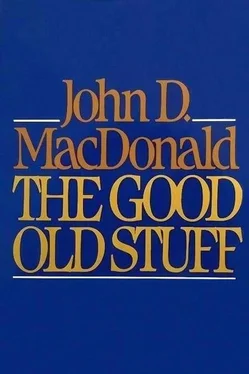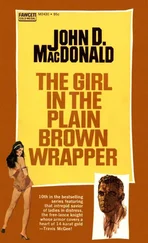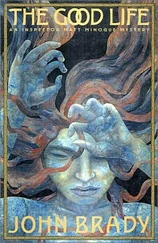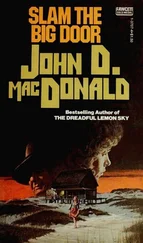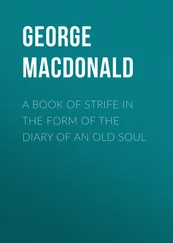He stood by the bed and looked down. There was a faint trace of color in her greenish cheeks, but she was breathing shallowly, rapidly. Her eyes were shut and seemed to have sunk farther back into her head. The nostrils looked pinched, and her hair had turned brittle and dead. Her lips were dry. She breathed rapidly through her mouth, and he could see the tip of her tongue protruding slightly beyond the even lower teeth.
As he looked down at her, he wondered if the slug had been meant for him, and he knew suddenly that he would soon be face to face with whoever had fired the shot. Whether Stella Galloway lived or died, he would stand face to face with someone, and with the new strength that corded his arms and shoulders he would smash that face with a fist like a rock.
Jones had been watching him. The elderly patrolman said, “You look good, Brock. You off the bottle?”
Brock transferred the anger that burned him. “What’s it to you?”
“Nothing, boy. Nothing at all.”
Stella Galloway’s lower jaw dropped and she began to breathe more hoarsely. Jones glanced at her and hitched his chair closer. “Miss Galloway! Stella!” he said insistently.
She didn’t answer. Brock turned and left the room.
At five they let the ones go who had been searched and interviewed. Captain Davis, acting on the report from the hospital, had assigned more men, and, while Brock had been over at the hospital, Inspector Durea had looked in for a few minutes.
The investigation had narrowed to three angles. One: Where had each person been when the shot was fired? Two: What had happened to the weapon? Three: Had the shot been fired at Galloway or Brock — and why?
At six only Brasher, the watchman, and Brock were left of the working force. Everyone else had been interviewed and dismissed with a warning to stay in town. Brock saw that Maclaren was weary, but he felt no weariness himself. He felt no hunger. He stood, solid and impassive, and listened to Maclaren, Horowitz, Cantrelle, and the others discuss the case, and he knew that, as for himself, he could keep going for an unknown period before exhaustion finally beat his strong body.
The trucks arrived with the floodlights, and the watchman let them into the yard. Lights were thrown across the piles of scrap, and everybody except Brasher and the watchman began to hunt for the pistol. Two men with a metal detector were left back in the office building, covering all the desks and closets and other possible hiding places.
Brock marked off the piles in which the assailant would have had no chance to hide the weapon. Horowitz looked at the other piles of scrap and groaned. “Give me a nice simple needle-and-haystack proposition any day.”
Brock searched along beside Horowitz and found out that of the working force of sixty-three there were fourteen who could not substantiate their location at the time the shot was fired. Eliminating the possibility that two or more had been in on it, they were left with fourteen suspects. Among those were Walter Brasher, Karkoff, Jane Tarrance, Hodge Oliver, and Pennworthy, the guard. The other nine included the receptionist in the lower front hallway; a stenographer named Nudens, who claimed she was in the women’s room; the operator of the indoor crane in the baling shop, who claimed he was out for a smoke; Brasher’s office boy, who couldn’t remember where he was; Boris Howe, the accountant, who said he was at the water fountain on the stair landing; two laborers in the back end of the yard near the loading platform; and two men who were off-loading aluminum scrap from a railroad car.
At ten o’clock a new batch of men reported, and many of the searchers went off duty. Maclaren sent Horowitz home for some sleep and looked as if he could use some himself.
At three in the morning there were no places left to search. The piles of scrap in which the gun could have been hidden were dismantled and restacked in new locations, piece by piece. The men stood around and inspected their bruised hands and wrists, felt gingerly of the small of their backs.
Brasher had gone home at midnight. Maclaren sent the rest of the men home except for one at the front door. The harsh lights were on in Brasher’s office. Maclaren, his face pale and lined, sat behind Brasher’s desk and drew red pencil marks on a small scale floor plan of the plant. Brock sat woodenly in one of the straight chairs, staring at the far wall.
Maclaren finished marking the plan and shoved it over to Brock. Brock said, “You sure you’re asking me for my opinion, John?”
“I’ve got no time to fight with you, Jud. We were good friends once.”
“That’s right. Until I was down and out. We were swell friends.”
Maclaren smiled at him. “Sure, kid. And one night I found you on Water Street in the gutter, and I took you home and got you cleaned up. You were still in bed when I went on duty in the morning. You got up, dressed, and left with my three shotguns. I had to pay eighty-eight dollars to get them out of hock. The next time you took the electric clock and the wife’s solid silver. Two hundred it cost the second time. I couldn’t afford it, kid.”
Brock waited a full thirty seconds, his face changing slowly. “I can’t even remember it, John. I’m sorry. I’ll pay back that money. I’ve got it in savings. I’m sorry.”
“Forget it. Look at the floor plan here. It shows the yard, shop and all. See the fourteen red circles? Those are where the ones say they were who can’t account for where they were at the time of the shot. The X shows where she fell, and the great big circle shows where somebody had to be to shoot her — whether they were aiming at you or not. Now look. This floor plan shows how it would have been impossible for Jane Tarrance, the guard, the receptionist, the girl in the can, Boris Howe, or the two guys unloading the aluminum to have gone over into the area from which the shot was fired. They would have been seen going and coming.
“That leaves us seven. Brasher and his office boy, Hodge Oliver, Karkoff, the two guys in the yard, and the crane operator.”
“You can take off Karkoff. The baler didn’t stop until long after the shot was fired. It won’t work without an operator.”
“Good work! On my own hook I’m taking out the office boy. That kid is too dopey to know which end of a gun to hold onto. Now we’re down to five: Brasher, Hodge Oliver, Lavery the crane operator, and the two guys in the yard. Let me see: Howard Barnes and Duke Schortz. Brasher, Oliver, Lavery, Barnes, or Schortz. Of course if more than one was in on it, we’re way out of line and we’ll have to start all over. Now we need the gun and the motive.”
“Could the gun have been tossed over the fence out into the weeds to be picked up later?”
“I thought of that and made a thorough check. Superman couldn’t have thrown it any farther than we looked.”
“Then it’s still on the place?”
“Unless either my boys or the matrons missed any spots on the people big enough to hide a forty-five. And my money says they didn’t.”
“How about the gun being tossed out of one of the front windows into a moving vehicle?”
Maclaren thought it over. “Boy, that booze didn’t soften your head any. I’ll have to consider that as a possibility.”
“Another thing, John. That slug split up when it went in. It had to have some encouragement. My guess is that somebody sliced it good before they loaded it. That means they wanted whoever they hit to stay dead, right?”
“Go on.”
“Okay, then. You put a deep notch in a forty-five slug and you spoil the ballistics. I figure that a guy who would know enough to notch it would know about it shortening his effective range. The slug hit her in the back while she was still forty feet from me. The odds are that he couldn’t have hit me with anything but an unmarked slug. That means it was aimed at her, not me, and you can look for motives for her death, not for mine.”
Читать дальше
